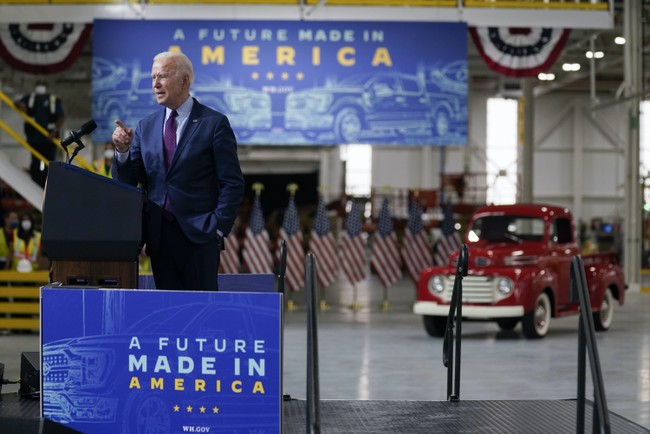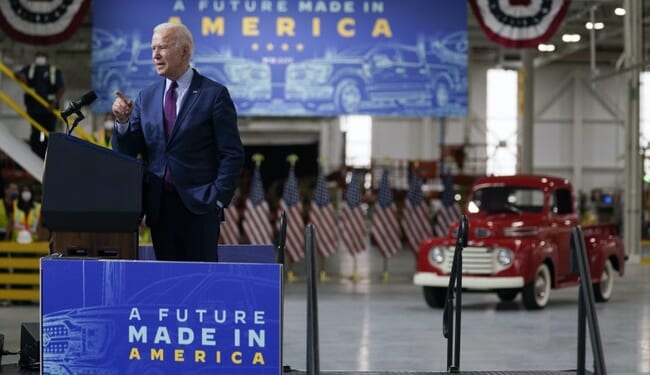
Of course, that makes me happy, but that’s neither here nor there. I’m only happy because I love to see something being shoved down our collective throats rejected and fail so spectacularly – worldwide, no less – that the frustration and teeth gnashing of those who would rule our every waking moment is palpable.
HAH!
We have some fight left in us yet.
In the U.K., currently EU-EV craze central, they’re having a helluva time unloading stock. Prices are down, inventory is way up, and nobody wants one of the damn things no matter what sort of lipstick they smear on it.
This is leading to a bit of a panic because if they don’t make their mandated sales percentages, it starts costing the manufacturers money in government fines. They’re already in a big enough financial hole at the moment as it is.
By 2024, UBS confidently predicted in a October 2020 report, the cost of manufacturing an electric car would have fallen so sharply that it would be on a parity with the cost of a petrol or diesel car. If you have looked on Auto Trader recently you may well have been fooled into thinking that this has come true.
A quick search offered me a brand new Peugeot e-2008, its price slashed from £38,495 to £26,495. Or I could have a Vauxhall Mokka-e, down from £41,895 to £29,793. According to the car trading platform, 77 per cent of new electric cars on its website are being advertised at a discount – in some cases, as the above figures show, bringing them down close to the sort of price you would pay for a petrol or diesel equivalent.
…The real reason for hefty discounts on electric cars is desperation. Since 1 January, manufacturers have been under the zero emissions mandate (ZEV), which demands that 22 per cent of the cars they sell in 2024 are pure electric cars. Should they fail to reach this target, they will be fined £15,000 for every vehicle by which they fall short
Ay, dios mio!
Push is going to have to come to shove for the government.
…Yet consumers are proving a lot more resistant to electric cars than the industry believed, with many citing the lack of charging points. Electric cars have established themselves as a premium project for well-off, environmentally-concerned motorists who enjoy access to off-street parking, but they are having serious problems widening their appeal to the mass market. There were recently reported to be 90,000 unsold EVs piling up in motor dealers’ forecourts in the US. Meanwhile, Chinese-made EVs are being diverted to Europe as tariffs of 27 per cent kept them out of the US. But the EU doesn’t want them either, and is also discussing punitive tariffs on Chinese-made cars – which isn’t exactly going to help Europe reach its decarbonisation targets.
One columnist is dumping his EV, for all the reasons – and more – that your average person isn’t buying one. “Getting to know you” wasn’t such a good thing in his case.
…But the downsides, as increasing numbers of people are realising, began to outweigh the advantages. The reasons are familiar. The overclaiming by the manufacturers on range in normal traffic conditions, the problems of finding chargers outside London.
On top of all this, the favourable tax treatment of electric vehicles is gradually being withdrawn, right down to the discounts on residents’ parking spaces.
At the end of last year, Germany abandoned, almost without warning, the €4,500 subsidy to electric cars. It was therefore no surprise to read that in March the sales there fell by 29 per cent compared to the same month a year ago.
…For an innovation to spread more widely, two things needs to happen. This group of relatively early adopters needs to reach a critical size so that other people can readily notice that the technology is being used and therefore gain confidence to adopt it themselves.
In addition, advances in the technology need to lead to its initial high price falling, often rapidly. Think, for example, of mobile phones or personal computers.
Electric cars simply have not improved rapidly enough. Their ranges remain restrictive and their price remains high.
…And so the group of early adopters are beginning to realise that the costs associated with electric cars are rather more than they imagined them to be. A simple point is the time and potential inconvenience associated with finding a charger and then waiting for it to charge.
Another fellow recently did the math on the time and effort it took him to charge an EV he had for a test run. This is, again, one of the primary concerns for the average consumer, particularly if they don’t own a home where they can pop it into the garage or work doesn’t have available charging stations. Lives are complicated enough, and time challenges are already a pain in the butt – who wants to add to that?
…No, it’s not about road trips. It’s that for many EV owners or intenders, charging at home or work just isn’t that easy.
I am a perfect example of the urbanite with limited access to charging. I live in a multi-unit, high-rise condo building, sharing a garage with many other residents. It’s an older building, built long before electric vehicles were on the market. So unlike with many new-construction residences, there are no fast chargers in the garage. I can charge using the 240V outlets, sure, but it’s slow.
There are some fast-charger options nearby, at least. I can walk/drive about 5-10 minutes to a new mixed-use development that has two ChargePoint chargers in the parking garages, or go a bit farther to a Whole Foods that has a couple of chargers. It’s not the biggest inconvenience in the world, but it is still a pain.
It also means that I have to plan my charging a bit, to bake in time to drive to the charger, hook up to the charger (assuming there’s one open), pay, lock the car, and walk home. And reverse those steps when I need the car again.
…Someday, perhaps even someday soon, range really will matter less to all EV drivers. Until then, it’s going to be a big deal to any EV driver that doesn’t have easy access to fast charging at home or work.
Last year, there was a head-to-head done on EV vs gas vs time for range and “fill-up” costs at California prices.
A writer for MotorTrend, William Walker, decided to take his electric pickup to a DC fast-charging station at a 7-11 in California. It took over an hour and cost $51.70 to charge the Ford F-150 Lightning from 13% charge to 80%.
A gas-powered Ford F-150 has a 23-gallon tank. At California’s current gas prices, it would have taken Walker 5 minutes and about $77 for a comparable fillup.
However, with the tank 80% full, the gas-powered F-150 goes for about 460 miles, whereas the electric will travel 227miles on 80% charge.
That’s $0.227 per mile for the electric truck and $0.167 for the gas-powered F-150.
Really makes you think, and, again – in most people’s cases, that EV isn’t going to be the winning choice. It’s not that a Tesla isn’t the coolest thing ever. It’s just not practical and too big a pain in the asterisk.
Even the CEO of Ford had a “D’oh!” moment, the fool.
…On a road trip across California, Ford CEO Jim Farley charged his Ford F-150 Lightning at a Level 2 charger. He spent 40 minutes charging the vehicle and was only able to get up to a 40% charge, which would give him about 90-130 miles of range until he’d be calling a tow truck.
Farley called it a “reality check.”
Kind of a shame it happened after the billions poured down the drain, but at least it happened.
No one has forty minutes to sit while a vehicle only charges enough to go less than 100 miles.
NO. ONE.
The British government, unfazed by their own or the German market collapse after rescinding tax incentives for EV purchases, has said they’re not considering reinstating those to goose sales. There won’t be any moolah for the manufacturers struggling to meet even this year’s 22% sales threshold.
Almost eight in 10 new electric cars are being sold at a discount as the industry reels from falling consumer demand.
Some 77pc of new electric vehicles (EVs) listed on Auto Trader were advertised at a discount last month, up from 55pc a year earlier, data from the company shows.
…He said: “Sales of electric vehicles are rising but as growth is still being driven from the fleet side of the market, more needs to be done to stimulate electric vehicle demand among private buyers where affordability remains the number one barrier.
“That said, manufacturers and retailers are fighting harder than ever to tempt customers… and that trend only looks set to accelerate as manufacturers struggle to meet strict zero emissions vehicle mandate targets in a much more competitive landscape.”
…But on Friday the Government, which scrapped plug-in grants for households two years ago, said it saw no need to reintroduce incentives for EV buyers.
Andrew Bergbaum, a global automotive expert at AlixPartners, said the winding back of incentives had “led to a significant reduction in affordability”.
NOPE – SORRY – CAN’T HELP YOU
Canadians, whose lunatic Prime Minister has been on a NetZero tear (besides everything else he’s been doing to ruin the country), are in a state of rebellion as far as EV mandates for the Frozen Tundra of the Canadian North.
They’re just saying “no” and in droves, which is driving the Green Fidelito bonkers.
The party’s over for EVs.
Taxpayers are expected to fund the charging network.
Don’t remember ever being taxed to pay to build a petrol station. Good products sell themselves.
Stick with petrol or bring in Hydrogen.
EV owners are being left with Betamax. https://t.co/2BXiVIFpRz— Lee Hurst #VoteAnyoneButLibLabConGreen (@LeeHurstComic) April 24, 2024
Until EVs are affordable, easy, and convenient to charge, repairs are affordable (they are breathtakingly expensive), and resale values are stabilized, these woeful stories will keep appearing.
The longer EVs are on the road, the more knowledge the consumer will have about what the true costs are, and what real benefits to the consumer – not Mother Earth – are, if any. It’s going to be very hard to bury the bad news as time goes on and it turns out most of the green advantages were pie-in-the-sky climate cult lies.
The EV market is a niche market, period. If you can afford one and have the time to indulge it, terrific. I think they’re cool and certainly have their place as vehicles.
But not in my garage.
I’ve got places to go and hurricanes to stock up for.
I want to be able to get there.
On time.












